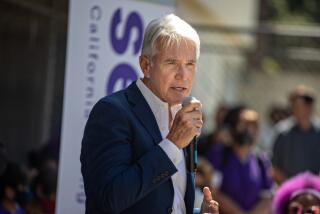Doubt Shrouds Spy Case
- Share via
Though the FBI has targeted scientist Wen Ho Lee as the prime suspect in the alleged passing of U.S. nuclear weapons secrets to China, government investigators concede that a lack of evidence makes it unlikely the Taiwan-born, naturalized American citizen will ever be indicted for espionage. Now the former chief of counterintelligence at the Los Alamos National Laboratory, where Lee worked for more than 20 years, charges that the case against Lee “was built on thin air,” lacking even “a shred of evidence” that he passed any secrets to Beijing.
Robert S. Vrooman, who ran the antispying unit at Los Alamos, further told the Washington Post that he believes Lee’s ethnicity played a major part in his being targeted by investigators. Energy Secretary Bill Richardson denies that and has recommended that Vrooman be disciplined for failing to lift Lee’s security clearance earlier. Vrooman says that decision was taken out of his hands by the Energy Department’s chief intelligence officer.
The most dramatic public claims about Chinese nuclear espionage came last May in a multivolume report issued by a select House committee chaired by Rep. Christopher Cox (R-Newport Beach). One of its starkest claims is that China “has stolen classified information on every currently deployed thermonuclear warhead in the U.S. ICBM arsenal,” including the design for the miniaturized W-88 nuclear warhead, the nation’s most advanced. But no evidence has been offered that this information originated at Los Alamos or came from Lee.
Vrooman notes that a fairly detailed description of the W-88 was distributed to 548 addresses at the Defense Department, the Energy Department, the service branches, various defense contractors and even the National Guard, providing ample opportunity for leaks. The CIA and the Senate Governmental Affairs Committee concluded earlier this year that no evidence points to Los Alamos as the source of any stolen secrets.
What’s beyond dispute is that China has worked patiently and unremittingly to obtain information about U.S. nuclear weapons and delivery systems, much of it apparently from published sources and much--according to the Cox committee and other investigators--through technology transfers and scientific exchanges. Where security breaches occur there is always a strong inclination to fix blame by identifying a particular villain. Maybe one or more exists in this case. For now, though, there seems to be no credible evidence that Wen Ho Lee fits that role.
More to Read
Sign up for Essential California
The most important California stories and recommendations in your inbox every morning.
You may occasionally receive promotional content from the Los Angeles Times.













